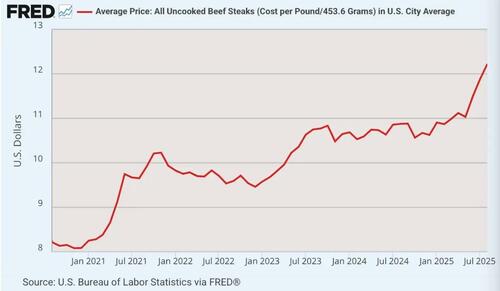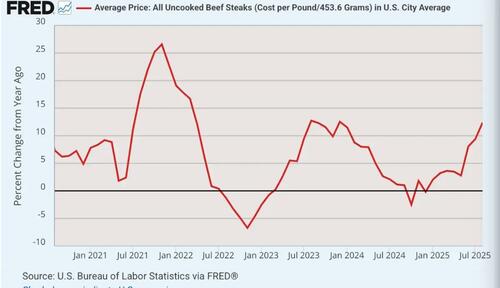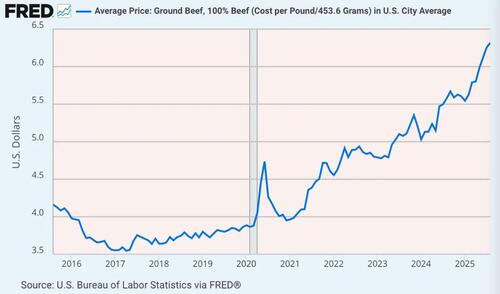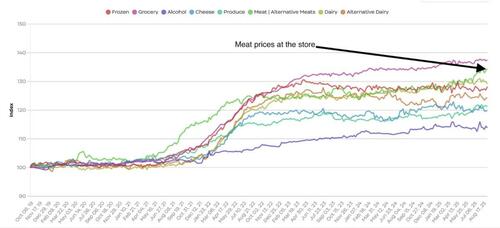Authored by Jeffrey Tucker via The Epoch Times,
The cost of beef at the grocery store continues to skyrocket, with prices rising week after week. Initially, many believed that prices would stabilize after the initial crisis, but that has not been the case. In fact, the problem is worsening over time.
Recent data on the Consumer Price Index (CPI) for ground beef reveals double-digit inflation rates. The price of beef steaks has increased by 50% in just five years and continues to rise.

Currently, the inflation rate for beef stands at a staggering 12.4%.

Over the past decade, the price of ground beef has doubled.

Industry sources confirm that beef prices are outpacing other grocery items.

As scientific evidence underscores the importance of beef for human health, the growing demand for beef products is colliding with a 50-year decline in herd sizes.
Data from feedlot reports indicates a continuous contraction in beef and dairy cattle inventories, posing challenges for the industry.
The Trump administration faces a potential crisis as rising food prices, especially beef, could impact public sentiment and political support. Urgent action is needed to address the escalating beef prices and ensure stability in the market.
Three key steps are proposed for immediate implementation by the Trump administration:
1. Emergency deregulation to remove barriers hindering farmers and suppliers from delivering products to stores.
The current regulatory framework, overseen by the USDA and APHIS, imposes significant bureaucratic hurdles that impede the supply chain. Streamlining these regulations and facilitating direct partnerships between sellers and wholesalers is crucial to ensuring a steady supply of safe and quality products.
2. Addressing the USDA’s monopoly on meat processing to reduce costs and increase supply.
The PRIME act, which advocates for state-level meat sales without full federal inspection, could alleviate processing bottlenecks and boost market availability.
3. Exempting imported meat from tariffs to alleviate price pressures on consumers.
Temporary exemptions on tariffs for imported meat could help stabilize prices and prevent further inflation in the beef market.
The Trump administration should collaborate with organizations like The Beef Initiative to promote localized and secure food systems. Empowering independent farmers to sell directly to consumers could enhance transparency and support local agriculture.
Efforts to address the beef crisis align with the administration’s priorities and could mitigate the impact of rising prices on consumers.
Ultimately, safeguarding access to affordable and high-quality beef is essential for public health and economic stability.
The Trump administration’s successful intervention in the egg crisis demonstrates the potential for proactive measures to alleviate market pressures and ensure food security. Similar strategies must be employed to tackle the challenges facing the beef industry.
Loading recommendations…

